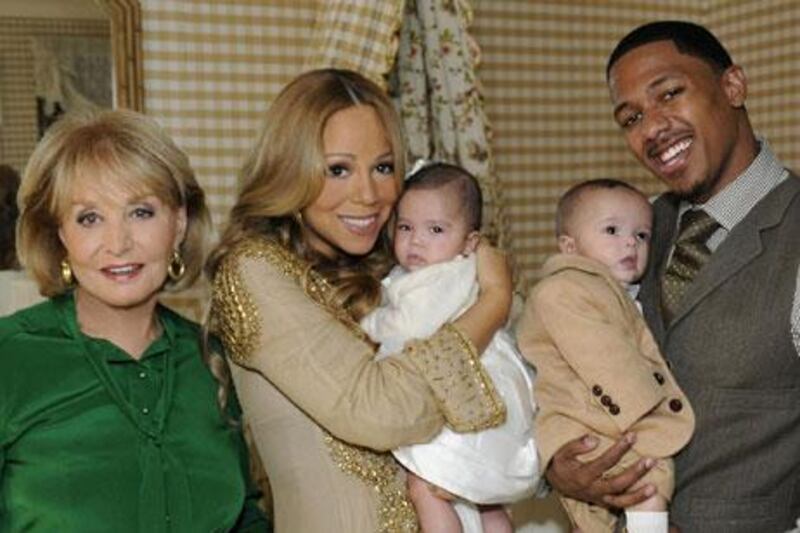When Mariah Carey's infant twins reach their pre-teen years, they're going to have some tough questions for their mum. Questions such as: "Why did you insist that a live version of your song Fantasy play when you gave birth to us?" And "why did you secure an exclusive television deal to unveil us to the world"?
Carey's six-month-old twins looked utterly baffled on the American primetime news programme 20/20 last month, when Barbara Walters entered their nursery, along with an entire film crew. The babies were propped up in a cot and dressed to the nines, Roc in an oversized tan suit and Roe in a lacy white dress. (Carey will also have to justify those nicknames.)
"We tried to doll them up for you," Carey told Walters. Then she sang a few lines of her hit 2005 song We Belong Together to a wide-eyed Roc.
Celebrities make weird choices. We love them for it. But the experts say they need to leave the kids out of it.
The children of the rich and famous can grow into well-adjusted adults, according to the New York psychologist Dr Fred Zelinger. But their parents must first make the choice to raise them in private, away from the media spotlight.
"[When] the children are actually included in the celebrity status, that worries me, psychologically," Zelinger says.
The risk is that children who are superficially worshipped as celebrity offspring won't develop a healthy sense of self-confidence or feel secure about their own accomplishments. "That attention might actually lead to a greater need for more - more celebrity, more status," he says.
Zelinger's wife, Dr Laurie Zelinger, specialises in child psychology and says children need consistency growing up. Celebrity is a fast-paced lifestyle, and she is concerned about the prospect of kids being raised on the run, not developing roots in a community and not bonding with their parents.
A predictable, private life allows kids to be kids - free from the pressure to look their best, or be on their best behaviour.
"If a celebrity child has a tantrum, that would make headlines," she points out.
Of course, privacy is easier said than done in a country where freedom of the press is a constitutional right and celebrity worship is a national pastime. Celebrity babies are a particularly popular attraction, because people like being able to relate to the big names – they like seeing that Heidi Klum drops her kids off at school, too.
American law allows pictures of anything the naked eye can see, explains Sandra Baron, the executive director of the Media Law Resource Center in New York City. That means it's fair game to aim your telephoto lens across someone's backyard and snap a picture of them pushing their kid on a swing. The pop star and new mother Pink took to her blog to denounce what she calls "the unsettling, surprisingly aggressive and unsafe measures" that the paparazzi have taken to try to get photographs of her daughter Willow.
"Like any parents, we believe our little girl deserves the right to have privacy and be protected, but unfortunately, this media climate doesn't seem to provide for that," she wrote. "We don't want our little girl's picture in a magazine or on a blog. If you take or publish her picture, it is against our wishes, and without our consent as parents, as people." America doesn't make it easy on celebrities. But sometimes they don't make it easy on themselves, either.
Take Jennifer Lopez, who thrust her twins Emme and Max into their first professional modelling gig at the age of two and a half. The mother and tots posed on the beach to promote Gucci's new children's line. Lopez told Us Weekly that she agreed to the gig because some of the money would go to charity. They've also been spotted in a lot of Gucci clothes since.
Many celebrities have agreed to sell baby pictures for top dollar in the name of charity, including Brad Pitt and Angelina Jolie, who donated half of the reported US$4 million (Dh14.7m) People magazine paid for their daughter Shiloh's baby pictures to charity. The couple said they hoped the pictures would satisfy the public appetite, and Shiloh would be left alone.
But the little girl hasn't left the spotlight since, notes the ethics analyst Dr Bruce Weinstein. He argues it is simply not an ethically intelligent decision to sell pictures of your child, no matter what the rationale.
"You're then sanctioning it as a parent," he said. "You're then saying, this activity can in some way be considered acceptable. It's not funny at all - I mean, we just don't know how it's going to affect children down the road."
But there's no end to the baby business in sight. Immediately after Carey's twins were introduced on 20/20, the pop diva launched a website, DemBabies, where she will share family photos of her son and daughter. All proceeds from those who choose to buy a picture will, of course, go to charity.





